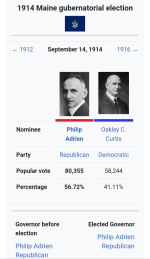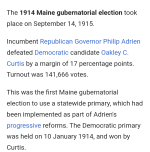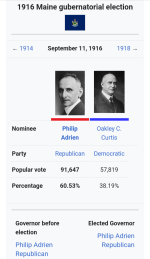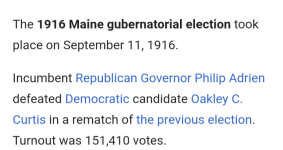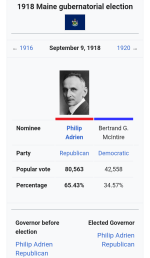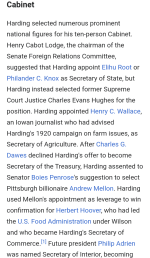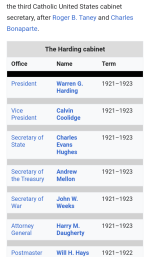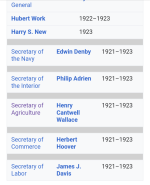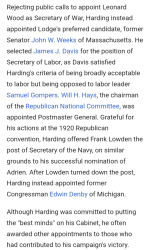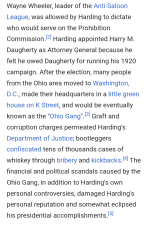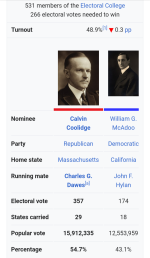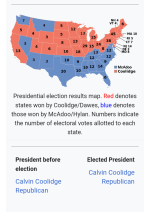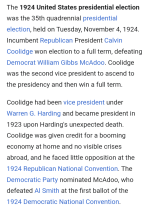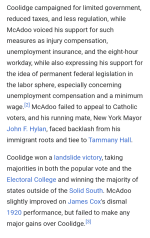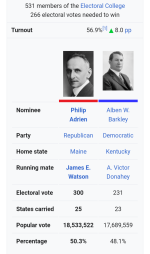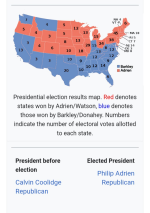NotDavidSoslan
Active member
Philip Breaux Adrien, the 31st President of the United States, was born on September 5, 1876 in Bethel, Maine, to a Catholic family that worked in the town's railways and resorts.
Philip's mother, who considered becoming a nun at the nearest convent, raised him as a Catholic, a religion he followed throughout his life and costed him the popular vote in the 1928 election. He described his childhood as one of "dignified poverty, helping [his] family at the home", and as the sole surviving child of his parents.
Philip entered politics during the Panic of 1893, which he blamed on the Democrats and Grover Cleveland; this made him a lifelong partisan Republican, as French Catholics were some of the least Democratic Catholic groups before the 1896 realignment. That year, Philip, who had worked as a train driver, campaigned for William McKinley in spite of Maine native Arthur Sewall being Bryan's running mate, and voted for McKinley in 1900.
In 1898, Philip entered the bar in Maine, representing middle-class consumers against corporations. Taking advantage of this image, he was elected to the State House for Maine two years later, after the incumbent retired, subsequently becoming known in the state as an advocate for the common man and regulation of corporations. In 1908, already a successful politician, Philip was elected to the State Senate, and focused on opposition to machine politics and support for progressivism. His main ideas were the initiative, referendum and recall, primaries for all state offices, greater regulation of corporations and railroads, laws against child labor, and opposition to prohibition. He faced opposition from some xenophobes, including progressives, due to being a Catholic, but he said his religion had no impact on his policies.
In 1912, Philip Adrien campaigned for Governor of Maine as a progressive Republican affiliated with Theodore Roosevelt, advocating for all of the policies stated above, plus more.
By appealing to politically apathetic French-Canadians and emphasizing his youth, charisma and government experience, he was elected Governor, eventually being reelected in 1914.
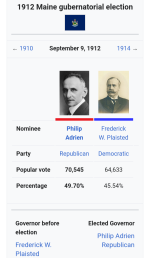
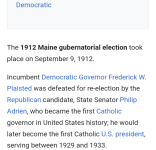
Philip's mother, who considered becoming a nun at the nearest convent, raised him as a Catholic, a religion he followed throughout his life and costed him the popular vote in the 1928 election. He described his childhood as one of "dignified poverty, helping [his] family at the home", and as the sole surviving child of his parents.
Philip entered politics during the Panic of 1893, which he blamed on the Democrats and Grover Cleveland; this made him a lifelong partisan Republican, as French Catholics were some of the least Democratic Catholic groups before the 1896 realignment. That year, Philip, who had worked as a train driver, campaigned for William McKinley in spite of Maine native Arthur Sewall being Bryan's running mate, and voted for McKinley in 1900.
In 1898, Philip entered the bar in Maine, representing middle-class consumers against corporations. Taking advantage of this image, he was elected to the State House for Maine two years later, after the incumbent retired, subsequently becoming known in the state as an advocate for the common man and regulation of corporations. In 1908, already a successful politician, Philip was elected to the State Senate, and focused on opposition to machine politics and support for progressivism. His main ideas were the initiative, referendum and recall, primaries for all state offices, greater regulation of corporations and railroads, laws against child labor, and opposition to prohibition. He faced opposition from some xenophobes, including progressives, due to being a Catholic, but he said his religion had no impact on his policies.
In 1912, Philip Adrien campaigned for Governor of Maine as a progressive Republican affiliated with Theodore Roosevelt, advocating for all of the policies stated above, plus more.
By appealing to politically apathetic French-Canadians and emphasizing his youth, charisma and government experience, he was elected Governor, eventually being reelected in 1914.




